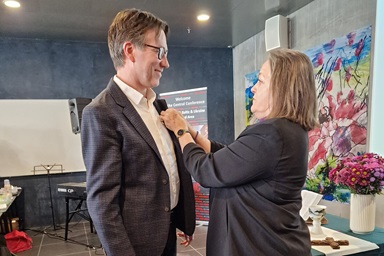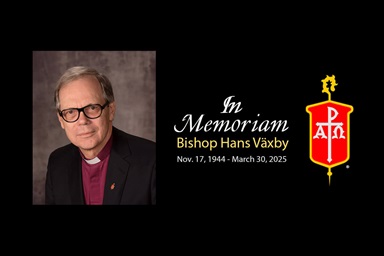Bishop Franz Werner Schäfer throughout his ministry served as a bridge between countries, ideologies and different streams of John Wesley’s movement.
The retired bishop, who led the church in Central and Southern Europe as well as North Africa from 1966 to 1989, died July 14 in Zurich. He was 95.
During his early years as bishop, he helped lead his area through the 1968 union of the Methodist Church with the Evangelical United Brethren Church to form The United Methodist Church. Throughout his episcopacy, he bridged differences on a divided continent.
His area included 10 diverse countries: Switzerland, France, Belgium, Austria (which belonged to democratic Western Europe) and Poland, Hungary, Czechoslovakia, Yugoslavia, Bulgaria (which belonged to Communist Eastern Europe). His area also included missions in North Africa.
“It was the time of the Cold War, the daily increasing nuclear threat, the ideological hardening, which caused the mistrust between East and West,” Schäfer later wrote. “We knew in the West where the ‘devil’ sits, and how we had to defend ourselves. The Eastern rulers knew this as well — with the roles reversed of course!”
Schäfer did not let such hostilities halt ministry. Wherever he traveled, he did not see ideologies or systems — he saw people, wrote Bishop Patrick Streiff, who today leads The United Methodist Church in Central and Southern Europe.
“He approached people with honesty, respect and appreciation,” Streiff said. “The result was that he was treated as a credible and trustworthy partner despite the many linguistic, societal, ideological and religious differences.”
Streiff added that Schäfer’s deep faith in Christ and the gospel supported the growth of the church.
From furrier to pastor
Schäfer, born March 10, 1921 in Switzerland, had an unlikely start for a pastor.
He grew up in a working-class family and was largely unchurched until at age 12, he reluctantly accepted an invitation to attend Methodist Sunday school.
His family could not afford for him to attend secondary school, so he started an apprenticeship as a furrier. However, his Methodist congregation intervened, encouraging Schäfer to leave the animal hides behind and become a shepherd.
In 1939, he began a year of practical studies in ministry at a Methodist congregation. The outbreak of World War II prevented him from attending theology school in Germany. Eventually, he completed his seminary training at the Basel Mission, and he was ordained an elder in 1949.
He served as pastor of Methodist churches in Berne, Baden and Lausanne before being appointed district superintendent of the church in Switzerland in 1959.
After Bishop Ferdinand Sigg died unexpectedly in 1965, the Central Conference of Central and Southern Europe elected Schäfer a year later. In 1973, he was elected for life.
Commitment to ecumenism
Throughout his time as bishop, he also worked for cooperation among various Methodist churches and contributed to interchurch work among various denominations. He was treasurer of the World Methodist Council and for four years was one of its presidents.
For ecumenical activities that spanned East and West, the theological faculty of Prague University recognized him with an honorary doctorate in 1985.
“In deep gratitude we think of his long life and ministry,” said retired United Methodist Bishop Heinrich Bolleter, who succeeded Schäfer in leading Central and Southern Europe. “We wish him the experience of God’s loving presence.”
A celebration of Bishop Franz Schäfer’s life will be at 2 p.m. Central European Time Zone on Aug. 8 in the Fraumünster Church in Zurich.
Hahn is a multimedia news reporter for United Methodist News Service. Contact her at (615) 742-5470 or [email protected].
Like what you're reading? Support the ministry of UM News! Your support ensures the latest denominational news, dynamic stories and informative articles will continue to connect our global community. Make a tax-deductible donation at ResourceUMC.org/GiveUMCom.




